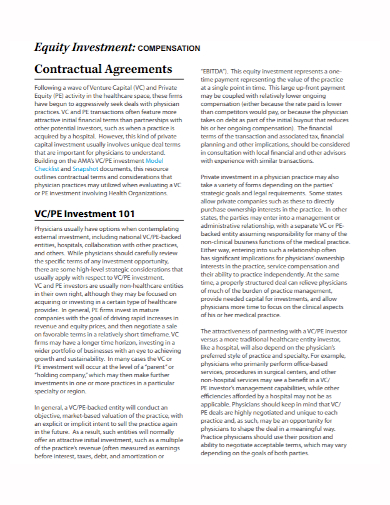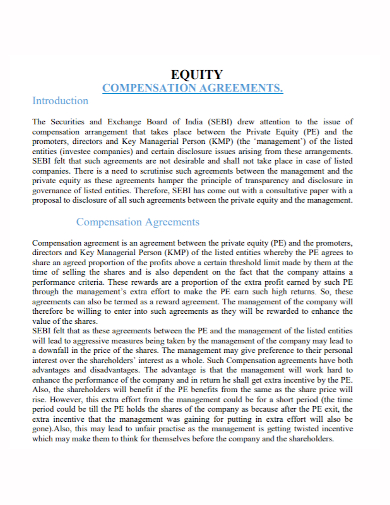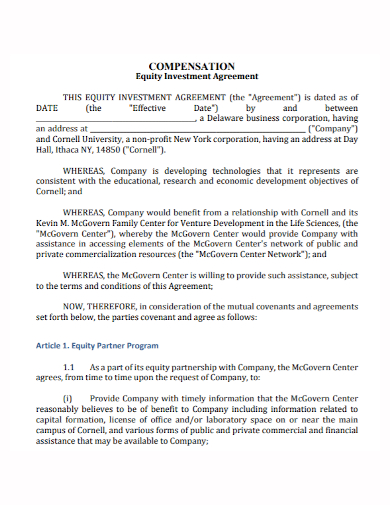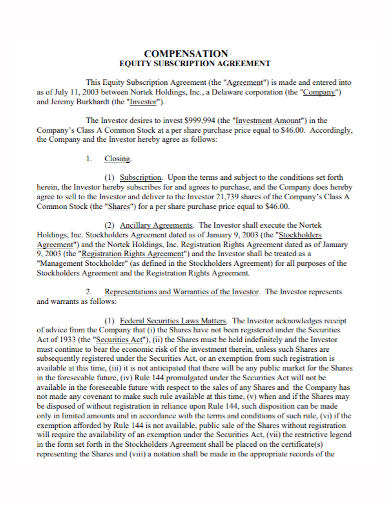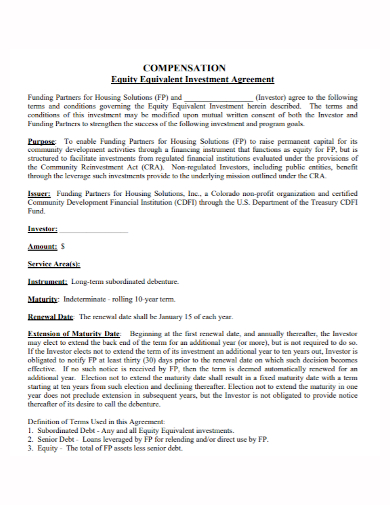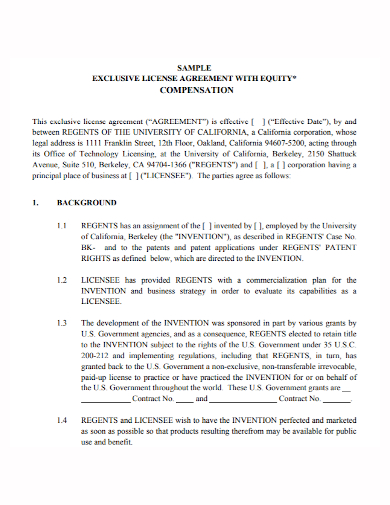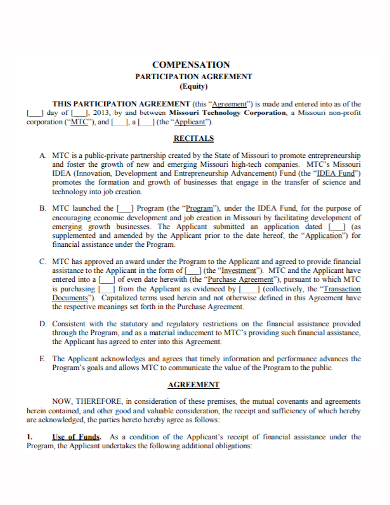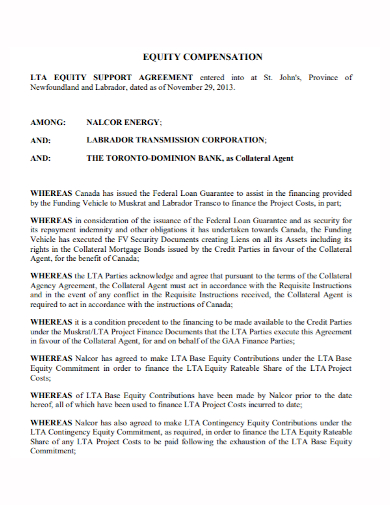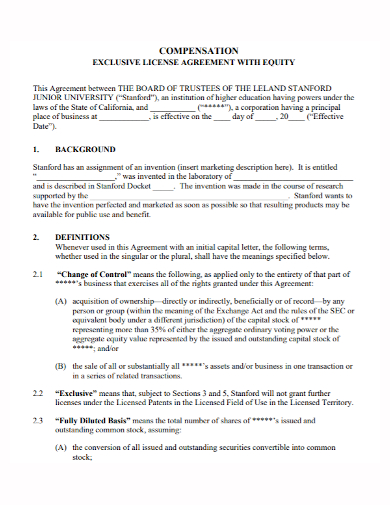Many public companies and some private companies, particularly startups, offer equity compensation as a benefit. Due to a lack of cash or a desire to invest cash flow into growth initiatives, equity compensation is a viable option for attracting high-quality employees. Employees at technology companies in both the start-up and mature stages have traditionally been rewarded with equity compensation. There is never a guarantee that your equity stake will pay off with equity compensation. Being paid a salary, as opposed to equity compensation (or in combination with equity compensation), can be advantageous because you know exactly what you’re getting. Your equity compensation can be influenced by a number of factors.
10+ Equity Compensation Agreement Samples
Employees can receive equity compensation in the form of non-cash compensation. Options, restricted stock, and performance shares are examples of equity compensation; all of these investment vehicles represent employee ownership in the company. Employees can share in the company’s profits through appreciation, which can encourage retention, especially if vesting requirements are in place. A below-market salary may be accompanied by equity compensation at times.
1. Equity Compensation Agreement Template
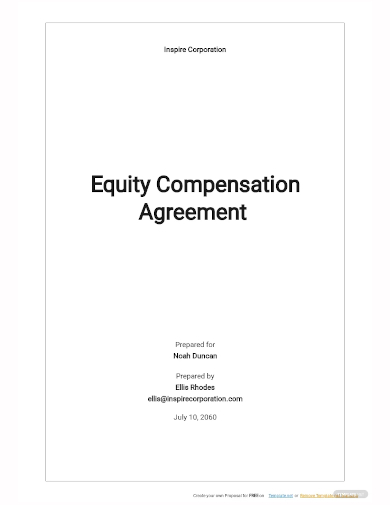
2. Equity Investment Compensation Agreement
3. Equity Compensation Agreement
4. Sample Equity Compensation Agreement
5. Equity Compensation Subscription Agreement
6. Equity Equivalent Compensation Agreement
7. Preferred Equity Compensation Agreement
8. Equity License Compensation Agreement
9. Equity Compensation Participation Agreement
10. Equity Compensation Support Agreement
11. Exclusive Equity Compensation Agreement
Types of Equity Compensation
- Stock options – Companies that provide equity compensation to their employees can give them stock options, which give them the right to buy shares of the company’s stock at a predetermined price, also known as the exercise price. This right may vest over time, allowing employees to take control of this option after a certain amount of time working for the company. They gain the right to sell or transfer the option when it vests. Employees are more likely to stay with the company in the long run if they use this method. The option, on the other hand, usually has a time limit.
- Non-qualified stock options and Incentive stock options – Non-qualified stock options (NSO) and incentive stock options are two other types of equity compensation (ISOs). Only employees have access to ISOs (and not non-employee directors or consultants). These options offer special tax benefits. Employers, for example, are not required to report when they receive non-qualified stock options or when they become exercisable.
- Restricted stock – The completion of a vesting period is required for restricted stock. After a certain amount of time has passed, vesting can be completed all at once. Vesting can also be done evenly over a set period of time, or in any other combination that the company’s management deems appropriate. RSUs are similar to restricted stock units in that they represent the company’s promise to pay shares based on a vesting schedule. Although this has some benefits for the company, employees do not gain any stock ownership rights, such as voting rights, until the shares are earned and issued.
- Performance shares – Performance shares are only given out if certain criteria are met. These could include things like an EPS target, a return on equity (ROE), or the total return of a company’s stock in comparison to an index. Performance periods are typically multi-year in duration.
FAQs
Why do employers issue equity compensation?
To help manage their cash flow, companies may offer equity compensation instead of a high salary. Reduced cash payments can be especially beneficial to smaller businesses and startups with limited cash on hand to attract top talent. Furthermore, businesses that provide equity compensation may be eligible for a tax credit, reducing their federal tax liability.
What is Phantom Stock?
Phantom stock, also known as synthetic or shadow stock, is a contract that simulates the benefits of stock ownership without requiring the recipient to actually own company stock. Your phantom stock’s value moves in lockstep with the stock price of the real company, and you’ll get paid based on how much your phantom shares appreciate over time. Despite the fact that phantom stock is based on a company’s equity or share price, these plans are technically classified as nonqualified deferred compensation plans rather than equity-based compensation plans.
If you want to see more samples and formats, check out some equity compensation agreement samples and templates provided in the article for your reference.
Related Posts
FREE 10+ Mentoring Agreement Samples In MS Word | Apple Pages | PDF
FREE 10+ Partner Agreement Samples In MS Word | Google Docs | Apple Pages | PDF
FREE 10+ Individual Agreement Samples In MS Word | Google Docs | Apple Pages | PDF
FREE 10+ Strategic Agreement Samples In MS Word | Google Docs | Apple Pages | PDF
FREE 10+ Equity Agreement Samples In MS Word | Google Docs | Apple Pages | PDF
FREE 10+ Producer Agreement Samples in MS Word | Apple Pages | PDF
FREE 10+ Grant Agreement Samples In MS Word | Apple Pages | PDF
FREE 8+ Meeting Agreement Samples in MS Word | Google Docs | Apple Pages | PDF
FREE 10+ Community Agreement Samples In MS Word | Google Docs | PDF
FREE 8+ Real Estate Option Agreement Samples in MS Word | PDF
FREE 10+ Call Option Agreement Samples In MS Word | PDF
FREE 10+ Advertising Agreement Samples In MS Word | Google Docs | Apple Pages | PDF
FREE 10+ Car Agreement Samples In MS Word | Google Docs | Apple Pages | PDF
FREE 10+ Horse Agreement Samples In MS Word | Apple Pages | PDF
FREE 10+ Option Agreement Samples In MS Word | Google Docs | Apple Pages | PDF

